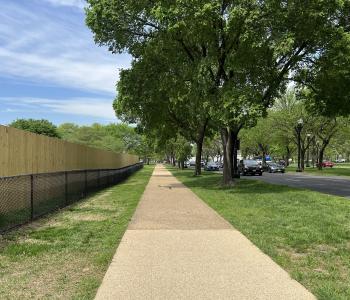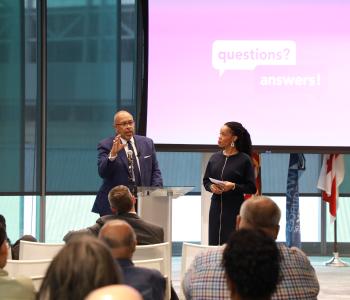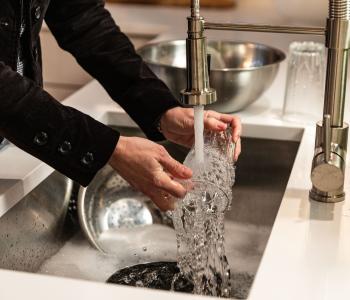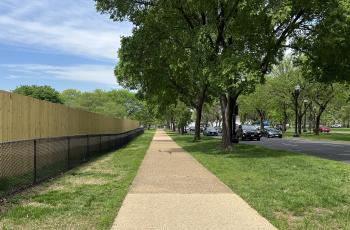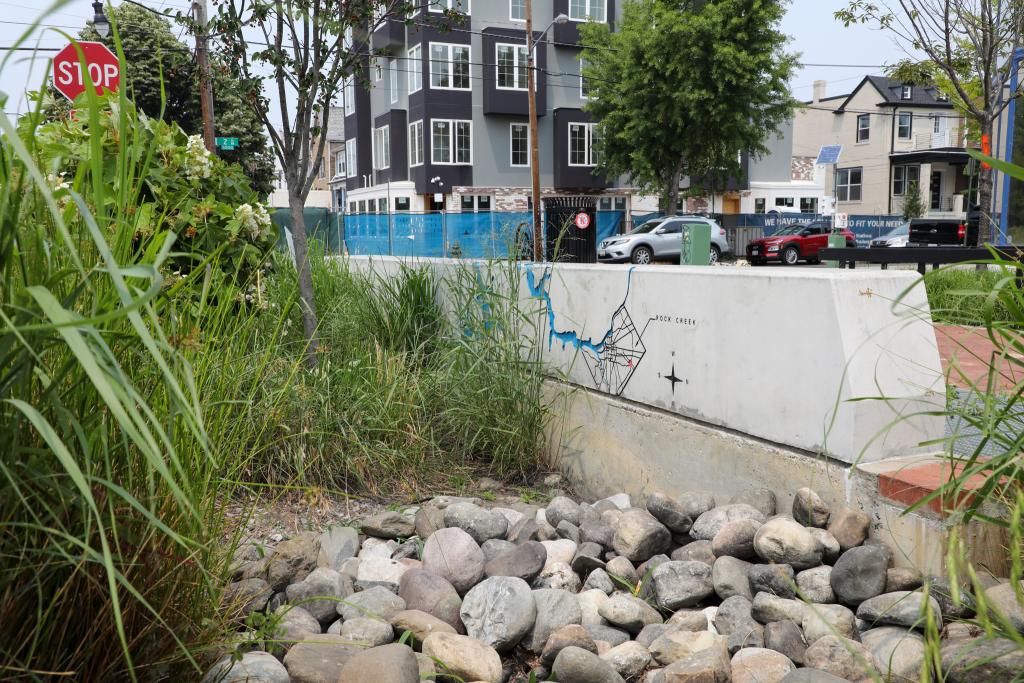DC Water Collecting and Testing Water Samples After Issuing a Boil Water Advisory
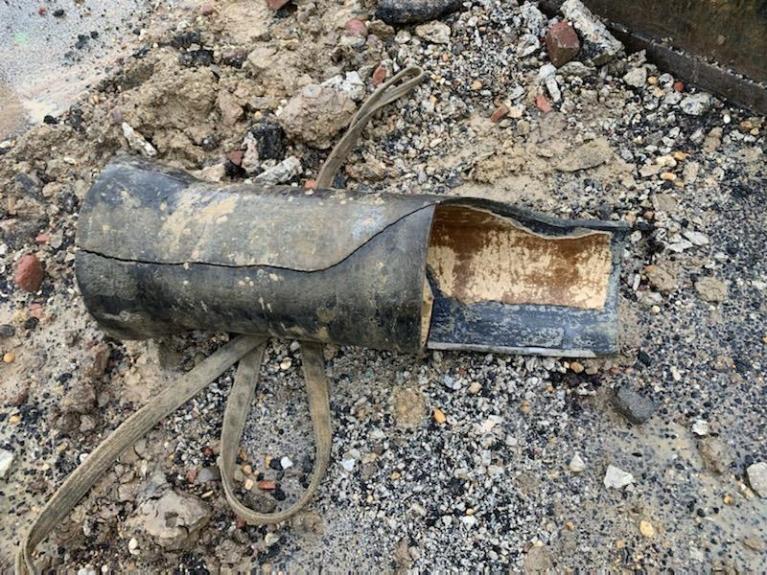
Today, the District of Columbia Water and Sewer Authority (DC Water) will collect water samples from four to five locations in the area of Northeast D.C. currently under a boil water advisory. These samples will be analyzed at DC Water’s laboratory. Test results should be available Tuesday afternoon. A second round of sampling will also take place tomorrow. Following two consecutive days of clear samples, DC Water will lift the current boil water advisory, which we expect will be on Wednesday.
DC Water crews have opened hydrants in the area to flush the distribution system by circulating fresh water through the system. This process can be repeated if needed.
DC Water issued the Boil Water Advisory after a temporary loss of pressure in the late afternoon of August 4, 2021. DC Water advised customers to boil water first before using for drinking or cooking if they are in the impacted area. This includes the neighborhoods of Edgewood, Brookland, Brentwood, Fort Lincoln, Langdon, Riggs Park, Woodridge, Queens Chapel, Michigan Park and North Michigan Park. The impacted area is generally:
- East of North Capitol Street
- West of Eastern Avenue
- South of New Hampshire Avenue
- North of New York Avenue
DC Water advises customers to search their address on the interactive map or call the 24-Hour Command Center at (202) 612-3400 to determine if they are in the impact area of this advisory. Customers in the affected area should boil water used for drinking and cooking. Customers outside this area can continue normal water use.
A 12-inch water main on V Street, NE between 33rd and South Dakota Avenue broke on Sunday causing a pressure drop. Overnight, crews repaired the water main and recharged the system. Next, DC Water will begin flushing water from the fire hydrant in the area to pull fresh water through the system. Simultaneously, DC Water will collect water samples to ensure the reduction in pressure did not adversely affect the water quality. DC Water will collect samples Monday and Tuesday and may be able to lift the notice on Wednesday May 31 when we have the results from Tuesday’s samples.
A valve in front of 3400 Commodore Joshua Barney Drive, NE will also need to be replaced this week. The valve replacement will require the water within a-few-block-radius to be shut off and those affected customers will be notified 24 hours prior to the water outage.
The pressure drop occurred as crews were attempting to isolate a leak on a 36-inch water transmission main. Repair work is now taking place at 13th Street, NW and Spring Rd and involves a steel-constructed main installed in 1936. Water from this leak eroded the roadway and caused it to buckle.
DC Water is excavating this transmission main at the leak. Once the water main is uncovered, crews will diagnose the problem and have a better sense of the timing for the repair. Large main repairs can take from a few hours to a few days, depending on the type of repair and availability of parts.
DC Water advises of the possibility that this repair activity could trigger a loss in system pressure. DC Water crews and staff are onsite actively monitoring the system pressure in this boil water advisory service area.
Additional information will be provided as soon as it is available. At 13th St NW and Spring Rd the construction is occurring in the roadway. Traffic is being diverted, with minimal impact to the flow of traffic. Still, motorists are advised to use an alternate route if possible.
The drinking water public notification began in the early morning hours of August 5. DC Water consulted with EPA Region 3 (the Authority’s regulatory body) and DC Homeland Security and Emergency Management (HSEMA) and notified elected officials and District agencies. A press release was distributed to media outlets and to those individuals who have signed up to receive news alerts. Most news outlets are covering the incident. DC Water is also employing social media, its website and NextDoor to further inform the public. The Mayor’s Community Corps ambassadors are canvassing neighborhoods door-to-door with informational fliers. DC Water set up a pop-up informational center at Turkey Thicket Recreation Center that has been providing information today and answering residents’ questions.
Following is information as it was provided in the initial Boil Water Advisory.
This is a precautionary notice to customers in the impacted area to boil water that may be ingested, due to water of unknown quality in this localized area of the system. This advisory will remain in place until follow-up testing confirms the water is safe to drink.
Customers in the impacted area should:
- Discard any beverages and ice made before and during this advisory.
- Run cold water until clear (if discolored) prior to boiling.
- Run cold water for 2 minutes if known sources of lead are present prior to boiling.
- Bring water to a rolling boil for 1 minute and let it cool.
- Store cooled water in a clean, covered container.
Cooled, boiled water or bottled water should be used for:
- Drinking
- Brushing teeth
- Preparing and cooking food
- Washing fruits and vegetables
- Preparing infant formula
- Making ice
- Giving water to pets
*Do not use home filtering devices in place of boiled or bottled water.
In the late afternoon of Wednesday, August 4, 2021, crews closed valves in the area of 13th Street and Spring Road, NW in an effort to isolate a leak on a 36” water transmission line to make repairs. Subsequently, DC Water received a number of calls from customers in Northeast DC who were experiencing low or no water pressure.
System pressure was restored within the hour and service has been fully restored.
Due to the loss of pressure in the system, it may have been possible for bacteria or other disease-causing organisms to enter the water through cracks, breaks or joints in the distribution system.
Bacteria and other disease-causing contamination such as viruses and parasites can cause symptoms such as diarrhea, cramps, nausea, headaches, or other symptoms. They may pose a special health risk for infants, young children, some of the elderly and people with severely compromised immune systems.
The symptoms above are not only caused by microbes in drinking water. If you experience any of these symptoms and they persist, you may want to seek medical advice. People at increased risk should seek advice about drinking water from their health care providers.
We have no information that the water was contaminated by this incident but issue this advisory as a precaution while we test the water. DC Water is currently collecting samples in the impacted area. The advisory will be lifted when tests on two consecutive days show no bacteria are present and all customers can continue normal water use, which we anticipate will be on Saturday, August 7.
Please share this information with all other people who drink this water, especially those who may not have received this notice directly (for example, people in apartments, nursing homes, schools, and businesses). You can do this by posting this notice in a public place or distributing copies by hand or mail.
Customers with water quality questions should contact the Department of Water Quality at (202) 612-3440 (Monday-Friday, 8 a.m. to 4:30 p.m.). All other questions should be directed to DC Water Customer Service at (202) 354-3600 (Monday-Friday, 8 a.m. to 5 p.m.), the 24-Hour Command Center at 202-612-3400 or the Office of Marketing and Communications at (202) 787-2200 (Monday-Friday, 8 a.m. to 5 p.m.).
Information is also available at www.dcwater.com and FAQs are provided at www.dcwater.com/boilwaterFAQ.


